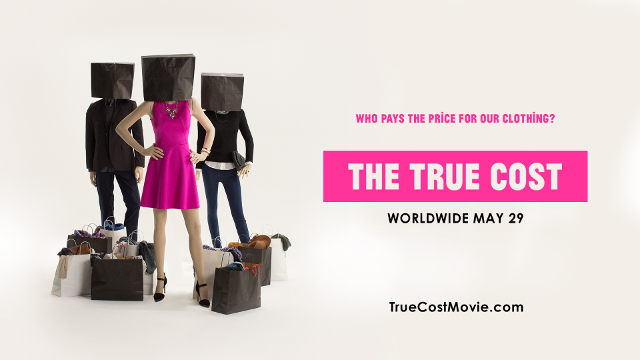Worth Watching: The True Cost
I wrote briefly about The True Cost a few weeks ago, and it opened in theaters and different streaming platforms Friday. We purchased the film and watched it Friday night, and overall, I enjoyed it. Director Andrew Morgan takes a close look at the stories behind fast fashion, which has become the mainstream source of clothing these days, and examines the issues at the core of the fashion industry. The building collapse at Rana Plaza features heavily in the film, and Morgan follows one young woman who must choose between raising her daughter and earning enough money to survive while working in a garment factory. The movie definitely pulls at your heartstrings, and it’s a great starting place if you’d like to learn the dirty truth behind the worldwide fashion industry.
Morgan relies on experts including Livia Firth, the founder of Eco-Age, a consulting firm that “manages ethics and aesthetics” (her husband, Colin Firth, is a partner), to address the human rights and environmental issues at stake. Firth, shown in one memorable scene at last year’s Copenhagen Fashion Summit, literally grills H&M’s director of sustainability. (You can see it here, beginning around 23:00.) Morgan also follows Safia Minney, the founder of U.K.-based People Tree, as she works with her suppliers and artisans in different countries. Several economists, as well as organic cotton farmers, factory owners, and doctors are interviewed, and the film succeeds at defining the problems within the industry.
Morgan is especially critical of fast fashion in the United States and argues that our culture of consumerism has led the fashion industry down a dangerous path, where human lives are at stake in the race to produce more and more merchandise at faster and cheaper rates. He shows YouTube videos of young women’s fast fashion hauls as an economist explains how low-income Americans, without health insurance or retirement plans, can buy two trendy shirts for $10 and suddenly feel rich. It’s an interesting argument and there is a lot of merit to it, but he doesn’t offer many alternatives to the current problem.
People Tree, Patagonia, and Stella McCartney’s brands are mentioned as ethical shopping alternatives, but the film ignores fair trade completely and fails to mention any of the hundreds (if not thousands) of ethical brands available today. That was the biggest disappointment in the film for me.
For the most part, I enjoyed The True Cost and hope it will get enough publicity to spark conversations and a bigger dialogue about the fashion industry. The film’s most important message, if there is just one, is that we as shoppers are responsible for our purchases, and we need to understand that other people, other living, breathing, human beings, make the clothing we buy. If we choose to ignore their working conditions and continue to wear labels that perpetuate slave labor and human suffering, then we are also participating in that process.
I hope you’ll take the time to watch The True Cost and form your own opinions, too. Please let me know if you do!


[…] Leah and Alden both reviewed The True Cost. Here’s my review. […]
[…] Fashion, arrived last week and I’ve been reading through it ever since. If you watched The True Cost, then you’re familiar with Minney and her efforts to create a completely transparent supply […]